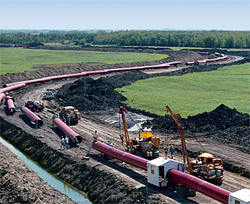The media are having a field day, reporting on Edelman's PR program for TransCanada's Energy East Pipeline that is under development to transport oil sands to eastern refineries/export terminals in New Brunswick.
 Media savvy Greenpeace obtained Edelman's PR program documents and is deftly spinning it as TransCanada's effort to "adopt the deceitful tactics employed by the oil industry."
Media savvy Greenpeace obtained Edelman's PR program documents and is deftly spinning it as TransCanada's effort to "adopt the deceitful tactics employed by the oil industry."
Outlets such as Canada's CBC and Toronto Star, the country's largest newspaper, took the bait. The CBC quoted a Greenpeace staffer accusing TransCanada of "dirty tricks" while the Star wrote of the effort to "browbeat detractors."
The New York Times story highlighted the focus on studying foes of the project and spreading negative findings about them.
The reports show the media's poor understanding of strategic communications. PR ain't tiddlywinks. It's more than stunts and publicity.
I've read Edelman's plan for TransCanada. The firm drew up a comprehensive program "from the modern political playbook."
It recommended a "three-track approach" that "strives to neutralize risk before it is leveled, respond directly to issues or attacks as they arise, and apply pressure—intelligently—on opponents, as appropriate." Basic PR.
The media played up the "pressure" portion of Edelman's approach:
"Add layers of difficulty for our opponents, distracting them from their mission and causing them to redirect their resources. We can't allow our opponents to have a free pass. They will use every piece of information they can find to attack TransCanada and this program—attacks are part of a larger modern oppositional effort to silence those on the other side.
"To make an informed decision on this project, Canadians need to have a true picture of the motivations not only of the project's proponents, but of its opponents as well. This point should particularly be made in communication to supportive third parties, who can in turn put the pressure, especially when TransCanada can't."
Edelman is describing the classic third party endorsement of PR. There's nothing underhanded about it.
The media took Edelman to task for its recommendation to obtain detailed background research on opponents of Energy East. The firm isn't exactly relying on undercover agents or moles.
The material is to come from public records, media reports and social media sources, financials, affiliations, legal issues, audits, business ties, government contracts, corporate campaigns and leadership. It's called doing your homework.
Edelman doesn't consider its blueprint "a response program but, rather a perpetual campaign to protect and enhance the value of he Energy East Pipeline and to help inoculate TransCanada from potential attacks in any arena."
One may disagree with the Energy East Pipeline and TransCanada's development of tar sands.
Edelman though is an advocate of TransCanada. Its Energy East campaign reflects that relationship.
It's time for the media to educate themselves about what modern PR firms do.


 There’s a fine line between newsjacking and taking advantage, aka ambulance chasing. Our job as PR professionals is to tread it carefully.
There’s a fine line between newsjacking and taking advantage, aka ambulance chasing. Our job as PR professionals is to tread it carefully. PR firms need to be mindful of ways their work product may be protected by the attorney-client privilege whenever working with a client’s internal legal team or its external legal counsel.
PR firms need to be mindful of ways their work product may be protected by the attorney-client privilege whenever working with a client’s internal legal team or its external legal counsel. Manuel Rocha, former US ambassador and intenational business advisor to LLYC, plans to plead guilty to charges that he was a secret agent for Cuba.
Manuel Rocha, former US ambassador and intenational business advisor to LLYC, plans to plead guilty to charges that he was a secret agent for Cuba. CEO mentoring is an often-overlooked aspect of why CEOs are able to make good decisions, and sometimes make bad ones—all of which intersects with the role and duties of a board.
CEO mentoring is an often-overlooked aspect of why CEOs are able to make good decisions, and sometimes make bad ones—all of which intersects with the role and duties of a board.  How organizations can anticipate, prepare and respond to crises in an increasingly complex world where a convergent landscape of global challenges, threats and risks seem to arrive at an unrelenting pace.
How organizations can anticipate, prepare and respond to crises in an increasingly complex world where a convergent landscape of global challenges, threats and risks seem to arrive at an unrelenting pace.


 Have a comment? Send it to
Have a comment? Send it to 
No comments have been submitted for this story yet.